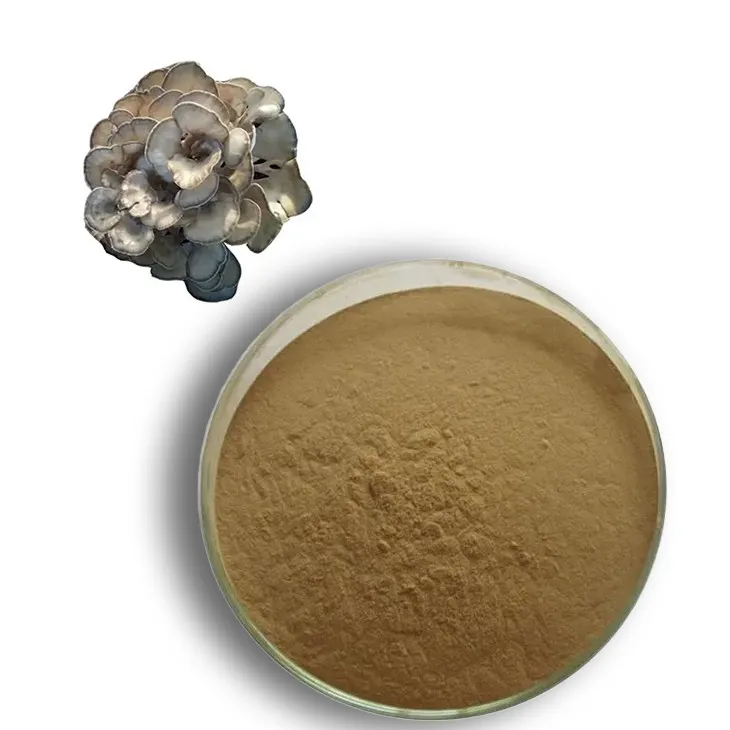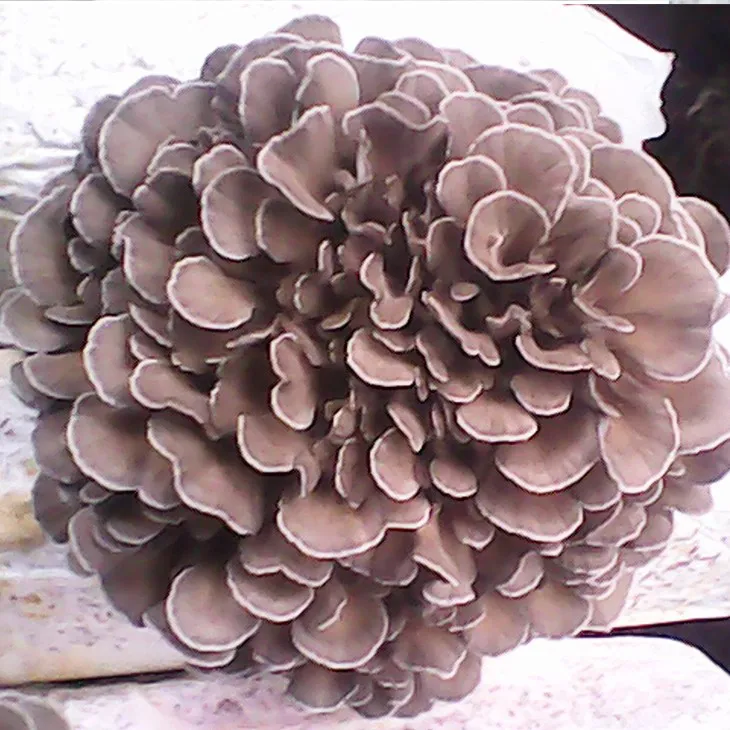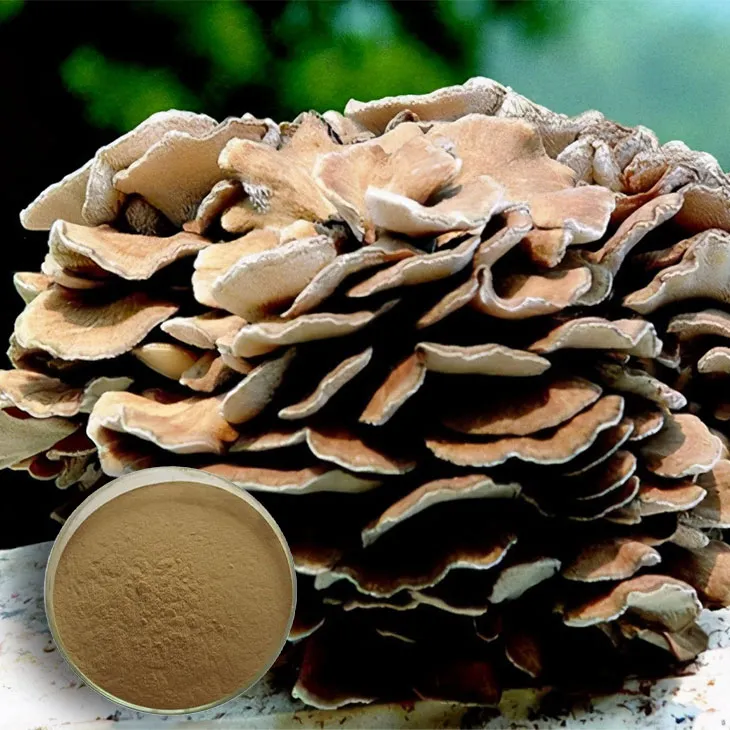- 0086-571-85302990
- sales@greenskybio.com
Best Answers to 7 Key Questions about Maitake Mushroom Extract.
2024-12-10

1. What is Maitake Mushroom?
Maitake mushroom, scientifically known as Grifola frondosa, is a large, edible mushroom native to Japan, China, and North America. It has a distinctive appearance with overlapping fronds or "leaves" that give it a ruffled, almost flower - like look. In the wild, it can be found growing at the base of oak trees and other hardwoods. Maitake has been an important part of traditional medicine in Asian cultures for centuries.

2. How is Maitake Mushroom Extract Made?
Maitake Mushroom Extract is typically made through a multi - step process. First, the fresh maitake mushrooms are harvested. Then, they are dried to reduce moisture content. After drying, the mushrooms are ground into a fine powder. There are different extraction methods used to obtain the active compounds from the powdered maitake. One common method is using solvents such as water or alcohol (ethanol). The solvent is used to dissolve the bioactive components from the powdered mushroom. This solution is then filtered to remove any solid particles, leaving behind a concentrated extract. Another method is through enzymatic extraction, which uses enzymes to break down the cell walls of the mushrooms and release the beneficial compounds more efficiently.

3. What are the Main Components of Maitake Mushroom Extract?
Maitake mushroom extract contains several important components:
- Polysaccharides: These are complex carbohydrates. One of the most studied polysaccharides in maitake is beta - glucan. Beta - glucans are known for their potential to stimulate the immune system. They can bind to receptors on immune cells, such as macrophages and neutrophils, and enhance their activity. This can lead to a more effective immune response against pathogens.
- Triterpenoids: These are a class of compounds that have various biological activities. In maitake, triterpenoids may have anti - inflammatory properties. They can help reduce inflammation in the body by inhibiting certain enzymes and signaling pathways involved in the inflammatory process.
- Amino acids: Maitake contains a range of amino acids, which are the building blocks of proteins. These amino acids are essential for various physiological functions in the body, such as building and repairing tissues, and producing enzymes and hormones.

4. What are the Health - Promoting Effects of Maitake Mushroom Extract?
Maitake mushroom extract offers a variety of health - promoting effects:
- Immune System Support: As mentioned earlier, the beta - glucans in maitake extract can enhance the activity of immune cells. This can help the body defend against infections, including viral, bacterial, and fungal infections. It may also be beneficial for people with weakened immune systems, such as the elderly or those undergoing chemotherapy.
- Blood Sugar Regulation: Some studies suggest that maitake extract may help regulate blood sugar levels. It may improve insulin sensitivity, which means that the body's cells can respond better to insulin. This can be helpful for people with type 2 diabetes or those at risk of developing diabetes.
- Cholesterol Management: Maitake extract may have a positive impact on cholesterol levels. It has been shown to potentially reduce LDL (bad) cholesterol levels while maintaining or increasing HDL (good) cholesterol levels. This can contribute to a healthier cardiovascular system.
- Anti - cancer Potential: While more research is needed, some pre - clinical and early clinical studies have indicated that maitake extract may have anti - cancer properties. The polysaccharides and triterpenoids in maitake may be able to inhibit the growth and spread of cancer cells by interfering with their cell cycle and inducing apoptosis (programmed cell death).
- Anti - inflammatory Effects: The triterpenoids in maitake extract can help reduce inflammation in the body. Chronic inflammation is associated with many health problems, including heart disease, arthritis, and autoimmune disorders. By reducing inflammation, maitake extract may help prevent or manage these conditions.
5. Is Maitake Mushroom Extract Safe?
Generally, maitake mushroom extract is considered safe for most people when taken in appropriate doses. However, there are some considerations:
- Allergic Reactions: Some individuals may be allergic to maitake mushrooms. Symptoms of an allergic reaction can include skin rashes, itching, swelling, and difficulty breathing. People with a known allergy to mushrooms should avoid maitake extract.
- Interactions with Medications: Maitake extract may interact with certain medications. For example, if you are taking medications to lower blood sugar or cholesterol, it is important to consult your doctor before taking maitake extract. It may potentiate the effects of these medications, leading to hypoglycemia (low blood sugar) or abnormal cholesterol levels.
- Dosage: Taking excessive amounts of maitake extract may cause adverse effects. It is important to follow the recommended dosage guidelines provided by the manufacturer or a healthcare professional.
6. How Should Maitake Mushroom Extract be Taken?
Maitake mushroom extract is available in various forms, including capsules, tablets, powders, and tinctures.
- Capsules and Tablets: These are the most convenient forms for many people. They are typically taken with water, following the recommended dosage on the product label. For example, it may be recommended to take one or two capsules per day.
- Powders: Maitake mushroom powder can be added to food or beverages. It can be mixed into smoothies, soups, or tea. When adding to a beverage or food, it is important to stir well to ensure even distribution. The dosage for powders may vary depending on the concentration of the active compounds in the powder.
- Tinctures: Tinctures are liquid extracts. They are usually taken by placing a few drops under the tongue or diluting in water and drinking. The dosage for tinctures is also determined by the product's concentration.
7. Where Can You Find High - Quality Maitake Mushroom Extract?
High - quality maitake mushroom extract can be found from several sources:
- Health Food Stores: Many health food stores carry maitake mushroom extract products. Look for stores that have a good reputation for selling high - quality supplements. Check the product labels for information on the source of the maitake mushrooms, the extraction method, and the purity of the extract.
- Online Retailers: There are numerous online retailers that sell maitake mushroom extract. However, it is important to be cautious when purchasing online. Look for well - known and reputable websites. Read customer reviews to get an idea of the quality of the product. Make sure the website provides detailed product information, including the ingredients, dosage instructions, and any potential side effects.
- Direct from Manufacturers: Some manufacturers sell their maitake mushroom extract products directly to consumers. Buying directly from the manufacturer can sometimes ensure that you are getting a high - quality product. You can often find more information about the product on the manufacturer's website, such as details about their production process and quality control measures.
FAQ:
Question 1: What is the origin of maitake mushroom extract?
Maitake mushrooms are native to certain regions in Japan, China, and North America. The extract is typically derived from these maitake mushrooms through various extraction processes. These mushrooms are often found growing in the wild, usually at the base of oak trees in temperate forests. They are now also cultivated for commercial production to obtain the extract.
Question 2: What are the main components of maitake mushroom extract?
The main components of maitake mushroom extract include polysaccharides, especially beta - glucans. These beta - glucans are believed to play a significant role in its potential health benefits. Additionally, it contains various amino acids, minerals such as potassium, and vitamins like B - vitamins. There are also some unique compounds like maitake d - fraction, which has been studied for its possible anti - cancer properties.
Question 3: What are the potential health - promoting effects of maitake mushroom extract?
Maitake mushroom extract has several potential health - promoting effects. It may help regulate blood sugar levels, which can be beneficial for diabetics or those at risk of diabetes. There is also evidence suggesting that it can enhance the immune system, helping the body to fight off infections more effectively. Some studies indicate that it might have anti - cancer properties, although more research is needed in this area. It may also contribute to improving cardiovascular health by reducing cholesterol levels and blood pressure.
Question 4: Is maitake mushroom extract safe to consume?
Generally, maitake mushroom extract is considered safe for consumption. However, as with any supplement, some people may experience mild side effects such as digestive discomfort. It is important to follow the recommended dosage instructions. Pregnant and breastfeeding women should consult their healthcare providers before using maitake mushroom extract, as there is not enough research on its safety for these groups.
Question 5: How should maitake mushroom extract be taken?
Maitake mushroom extract is available in various forms, such as capsules, powders, and tinctures. If taking capsules, it is usually recommended to follow the dosage instructions on the product label. For powders, they can be mixed with water, juice, or other beverages and consumed. Tinctures are typically taken in small amounts, usually diluted in water, as directed by the product. It is advisable to start with a lower dose and gradually increase if needed, while observing any reactions in the body.
Question 6: Can maitake mushroom extract interact with medications?
There is a possibility that maitake mushroom extract may interact with certain medications. For example, it may enhance the effects of medications for diabetes, which could potentially lead to hypoglycemia if not monitored properly. It may also interact with medications that affect the immune system or blood clotting. Therefore, if you are taking any medications, it is crucial to consult your doctor or pharmacist before starting to take maitake mushroom extract.
Question 7: Where can one find high - quality maitake mushroom extract?
High - quality maitake mushroom extract can be found in health food stores, some pharmacies, and online supplement retailers. When choosing a product, look for ones that are from reputable brands. Check for third - party testing or certifications, which can indicate the quality and purity of the extract. Also, read customer reviews to get an idea of the effectiveness of the product.
Related literature
- The Health Benefits of Maitake Mushroom: A Comprehensive Review"
- "Maitake Mushroom Extract: Composition, Properties, and Therapeutic Applications"
- "Safety and Efficacy of Maitake Mushroom in Health and Disease"
- ▶ Hesperidin
- ▶ Citrus Bioflavonoids
- ▶ Plant Extract
- ▶ lycopene
- ▶ Diosmin
- ▶ Grape seed extract
- ▶ Sea buckthorn Juice Powder
- ▶ Fruit Juice Powder
- ▶ Hops Extract
- ▶ Artichoke Extract
- ▶ Mushroom extract
- ▶ Astaxanthin
- ▶ Green Tea Extract
- ▶ Curcumin
- ▶ Horse Chestnut Extract
- ▶ Other Product
- ▶ Boswellia Serrata Extract
- ▶ Resveratrol
- ▶ Marigold Extract
- ▶ Grape Leaf Extract
- ▶ New Product
- ▶ Aminolevulinic acid
- ▶ Cranberry Extract
- ▶ Red Yeast Rice
- ▶ Red Wine Extract
-
Peppermint Oil
2024-12-10
-
Beetroot Powder
2024-12-10
-
Diosmin
2024-12-10
-
Licorice Root Extract Powder
2024-12-10
-
Acerola Extract
2024-12-10
-
Sophora Flavescens Root Extract
2024-12-10
-
Purple Sweet Potato Extract
2024-12-10
-
Chasteberry Extract
2024-12-10
-
Thunder God Vine Extract
2024-12-10
-
Acerola Juice Powder
2024-12-10





















